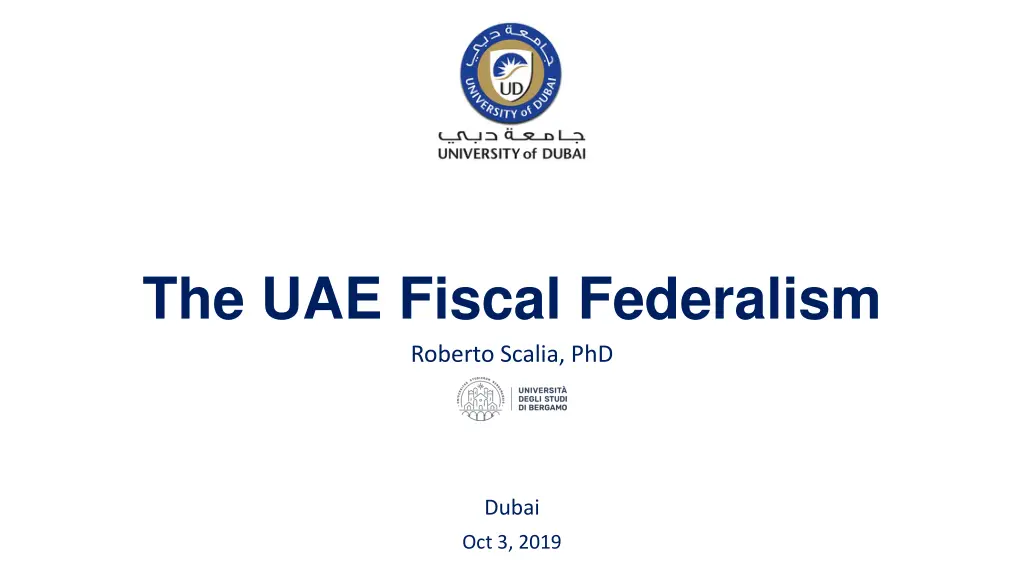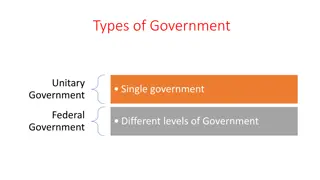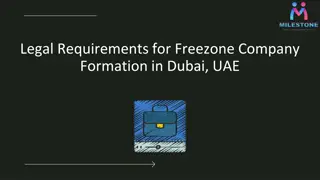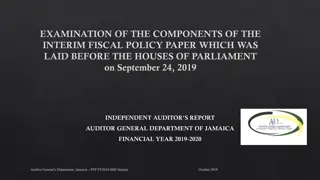
UAE Fiscal Federalism Analysis: Importance and Challenges
Explore the significance of the UAE fiscal federalism system, including its history, constitutional basis, taxing powers, and future prospects domestically and internationally. Delve into the country's compliance with international standards and the complexities faced in implementing exchange of information regulations. Consider the relevance of fiscal federalism in evaluating the UAE's fiscal policies.
Download Presentation

Please find below an Image/Link to download the presentation.
The content on the website is provided AS IS for your information and personal use only. It may not be sold, licensed, or shared on other websites without obtaining consent from the author. If you encounter any issues during the download, it is possible that the publisher has removed the file from their server.
You are allowed to download the files provided on this website for personal or commercial use, subject to the condition that they are used lawfully. All files are the property of their respective owners.
The content on the website is provided AS IS for your information and personal use only. It may not be sold, licensed, or shared on other websites without obtaining consent from the author.
E N D
Presentation Transcript
The UAE Fiscal Federalism Roberto Scalia, PhD Dubai Oct 3, 2019
Does the UAE Fiscal Federalism deserve attention? History of UAE Fiscal Federalism The Constitutional basis of UAE Fiscal Federalism Taxing Powers of the Union and of the Emirates The Future of UAE Fiscal Federalism at Domestic and International level
Does the UAE Fiscal Federalism deserve attention? History of UAE Fiscal Federalism The Constitutional basis of UAE Fiscal Federalism Taxing Powers of the Union and of the Emirates The Future of UAE Fiscal Federalism at Domestic and International level
Does the UAE FF deserve attention? 1. The international argument 3. The forthcoming taxes argument 2. The existing taxes argument
Does the UAE FF deserve attention? 1. The international argument 3. The forthcoming taxes argument 2. The existing taxes argument In the last 15 to 10 years The UAE International policy has been that of being in full compliance with International standards. This is the case, namely, for the OECD sc. transparency rating . As reported by the OECD: The Global Forum completed its first round of peer reviews in 2016, and subsequently established a Fast-Track review procedure, which was a one-time process to allow jurisdictions to quickly demonstrate the progress made in implementing the international standard on exchange of information on request (the EOIR standard). The Global Forum s fast track process was conducted in 2016. It was a rigorous process and informed by peer input but did not involve an on-site visit and does not substitute a full peer review The UAE is a provisionally largely compliant country (the largely compliant club includes: Canada, Germany, Denmark, USA and UK). The Report 2016 stems from the preassumptions that The UAE [is] a federation of seven sovereign Emirates and, than highlights many of the difficulties that the country showed in implementing Exchange of Information. Are such difficulties duly evaluated in the context of the review process? What (if any) are the elements that helps in supporting that the OECD rating might be different? Is the definition of fiscal federalism relevant for this purposes?
Does the UAE FF deserve attention? 1. The international argument 3. The forthcoming taxes argument 2. The existing taxes argument In the last 15 to 10 years The UAE International policy has been that of being in full compliance with International standards. For quite long period of time scholars and practitioners have been deserving little if any attention to the issue of taxation in the UAE stemming from the pre-assumption that taxes are not applied in the UAE. Reference was made to the single Emirates Income Tax Law, considering that a UAE federal income tax does not exist. Since the introduction of VAT and Excise Taxes the sharing the pie dilemma arises
Does the UAE FF deserve attention? 1. The international argument 3. The forthcoming taxes argument 2. The existing taxes argument There is an undergoing discussion all around the GCC on taxes that might lead to a fiscal diversification , eliminating GCC States budget reliance on natural resources. What are the legal basis (if any) on which a new Income Tax could be created? What are the legal basis (if any) other new taxes could be introduced?
Methodological Approach Hierarchy of norms Chronologies GCC Charter and EA (1960) State (or Emirate) Tax Rules UAE Constitution (1971) UAE Constitution Union Tax Rules (1981/2001) GCC Charter and EA State (or Emirate) Tax Rules (2017) Union Tax Rules
Does the UAE Fiscal Federalism deserve attention? History of UAE Fiscal Federalism The Constitutional basis of UAE Fiscal Federalism Taxing Powers of the Union and of the Emirates The Future of UAE Fiscal Federalism at Domestic and International level
Does the UAE Fiscal Federalism deserve attention? History of UAE Fiscal Federalism The Constitutional basis of UAE Fiscal Federalism Taxing Powers of the Union and of the Emirates The Future of UAE Fiscal Federalism at Domestic and International level
Power to tax vs Duty to pay taxes Power to Tax Duty to pay taxes Article 126 Constitution Article 42 Constitution The Union s general revenue accrue from different resources one out of which is taxes In matters within the legislative and executive jurisdiction of the Union Paying taxes is a duty upon every citizen Article 25 Constitution All persons are equal before the law Article 133 Constitution a. No distinction based on nationality No Union tax shall be imposed, varied or abolished except by means of a law b. Tax Treaty entitlement a. Meaning of law b. Substantive vs Procedural rules
The economic relationships Article 11 Constitution The three main economic purposes Economic & Custom Union Free Movement Capital/Goods Abolition of Taxes GCC (1) GCC (2) Attribution of competences to the GCC Non discrimination
Does the UAE Fiscal Federalism deserve attention? History of UAE Fiscal Federalism The Constitutional basis of UAE Fiscal Federalism Taxing Powers of the Union and of the Emirates The Future of UAE Fiscal Federalism at Domestic and International level
Approach(es) to UAE Fiscal Federalism Article 5 Constitution Sovereignty rests with the Union Sovereignty was ceded by the single Emirates Room for comparing the UAE experience with US bargaining experience? Room for adapting the notions and concepts concerning the UK legal and tax environment? Room for comparing the UAE experience with other former colonies one? By a comparison of the two legal and tax system (despite the common label ad Union ) the two system are fairly different The role of one leading State and the common goals lead to consider the UAE experience as not comparable to others The powers ceded (those relevant in a international tax law perspective) were formerly in the hands in the UK
Figuring out the UAE Fiscal Federalism Cooperation among Government levels Distribution of Taxing Powers Questions arising in fiscal federalism contexts involve (1) knowing who should do what , (2) who should levy which taxes , (3) how should imbalance between revenues and expenditures of sub-national governments be resolved (and related adjustments effected) and (4) which rules are to govern sub-national borrowing Article 13 Constitution The Union and Member States shall cooperate within the limits of their jurisdiction and abilities Article 10 Constitution Cooperation, however, shall co-exist with protection of sovereignty and independence of each any Emirate Elements conditioning the analysis a. An economy almost entirely based on the oil-extraction industry, b. the leading role of one of the six emirates, due to its wealth and c. the secondary role of the other emirates (based on the same underlying circumstance). Articles 2 and 3 Constitution Distribution of powers relies upon such pre- assumptions
The residual nature of Emirates Taxing Power Emirates Competence Federal Taxes Competence of the Emirates is within all matters not within the jurisdiction of the Union The revenue sharing mechanism. Narrowing the scope of Emirates taxing powers due to new Federal Taxes a. Are such taxes already outside Emirates competence? b. Notion of federal tax ? c. Formerly existing Emirates Income Tax?
Does the UAE Fiscal Federalism deserve attention? History of UAE Fiscal Federalism The Constitutional basis of UAE Fiscal Federalism Taxing Powers of the Union and of the Emirates The Future of UAE Fiscal Federalism at Domestic and International level
Future Taxes (?) Legal basis for a Federal Income Tax Emirates Income Taxes: Old tool for new needs? A legal basis for a Federal Income Tax could be envisaged in Articles , read in conjunction.
Future Tax Procedural and Judicial environment Judicial protection Procedural rules It might be beneficial the creation of specialised Tax Courts (both at Federal and Emirates level) Implementation of VAT intra-GCC rules implies an effective and smooth procedural system fitting the needs to: - Ensure clarity, efficiency and avoiding excessive burden on taxpayers, and in the meanwhile The Supreme Court would still retain in the hands the tools to ensure the coherence of the tax system as a whole (Article 99 Constitution) - Allows the FTA to contrast tax evasion and fraud - In full compliance with International standards A closer cooperation among Union and Emirates is key in achieving these different objectives






















